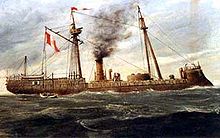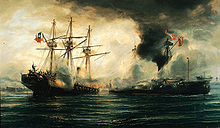- Miguel Grau Seminario
-
Miguel Grau Seminario 
Peruvian Admiral during the War of the PacificBorn July 27, 1834
Paita, PeruDied October 8, 1879 (aged 45)
Near Punta Angamos, BoliviaMiguel María Grau Seminario (Paita, Peru, 27 July 1834 – Punta Angamos, Bolivia, 8 October 1879) was a renowned Peruvian naval officer and hero of the Naval Battle of Angamos during the War of the Pacific (1879-1884). He was known as the el Caballero de los Mares (Spanish for "Gentleman of the Seas") for his chivalry and is esteemed by both Peruvians and Chileans. He is an iconic figure for the Peruvian Navy, and one of the most famous merchant marine and naval military leaders of America.
Contents
Early life
Miguel Grau was born in Paita on 27 July 1834 in the house of Dr. Alexander Diamont Newel with the assistance of the midwife Tadea Castillo, also known as "The Morito," both prominent figures in Paita. His father was Don Juan Manuel Grau y Berrío, a Colombian who came to Peru with Bolivar in the fight for independence from Spain. Later, Don Juan bought property in Paita and worked at the Customs Office. His mother, Luisa Seminario y del Castillo, motivated Grau to love the sea from his youth. He entered the Paita Nautical School. He first went to sea when he was nine years old, going to Fortune, Colombia, aboard a merchant schooner. The schooner sank and he returned to Paita. Grau later went on various merchant ships to ports in Oceania, Asia, America and Europe. These voyages gave Grau the seagoing experience that was the foundation for his brilliant career as a nautical officer.
Early career
In 1853, at the age of 19, he left the merchant marine and became an officer candidate of the Peruvian Navy, where he developed an outstanding professional reputation. In 1854, he was Military officer of the steamer Rimac. His career was rapid and brilliant. In 1863, he was promoted a year later. In 1864, he was sent to Europe to oversee the construction of ships for the Peruvian fleet. He would be put in prison a year later but was later released. Among these ships was the ironclad Huáscar, launched in 1865 by Laird at Birkenhead. Upon his return, Chile and Peru joined together in a bi-national fleet against Spanish attempts to reclaim their American colonies. In 1868, he was recalled to the Navy and was named commander of the Huáscar with the rank of Lieutenant Commander and was later promoted to Commander. By June 1, 1874, he became the commanding officer of the Peruvian Navy's fleet as Captain, and later became a member of the Congress of the Republic of Peru as an elected congressman in 1876 representing Paita.
War of the Pacific
When the War of the Pacific against Chile began on 5 April 1879, Miguel Grau was aboard the Huáscar, as its captain and the Commander of the Navy. Capitán Grau played an important role by interdicting Chilean lines of communication and supply, damaging, capturing or destroying several enemy vessels, and bombarding port installations. Grau's Huáscar became famed for moving stealthily, striking by surprise and then disappearing. These actions put off a Chilean invasion by sea for six months.
The Gentleman of the Seas
At the Battle of Iquique, after Huáscar sank the Chilean corvette Esmeralda by ramming her, Grau ordered the rescue of the surviving crew from the waters. Grau also wrote condolences to the widow of his opponent Arturo Prat, returning his sword and personal effects.
Letter to Carmela Carvajal de Prat (Prat's widow)
- Dear Madam:
- I have a sacred duty that authorizes me to write you, despite knowing that this letter will deepen your profound pain, by reminding you of recent battles.
- During the naval combat that took place in the waters of Iquique, between the Chilean and Peruvian ships, on the 21st day of the last month, your worthy and valiant husband Captain Mr. Arturo Prat, Commander of the Esmeralda, was, like you would not ignore any longer, victim of his reckless valor in defense and glory of his country’s flag.
- While sincerely deploring this unfortunate event and sharing your sorrow, I comply with the sad duty of sending you some of his belongings, invaluable for you, which I list at the end of this letter. Undoubtedly, they will serve of small consolation in the middle of your misfortune, and I have hurried in remitting them to you.
- Reiterating my feelings of condolence, I take the opportunity of offering you my services, considerations and respects and I render myself at your disposal.
- (Signed) Cpt. Miguel Grau
At the port of Antofagasta, after sneaking up on an enemy ship, he courteously asked the crew to abandon ship before opening fire. These and other gestures earned him the nickname of el Caballero de los Mares ("Gentleman of the Seas") from his Chilean opponents, acknowledging an extraordinary sense of chivalry and his gentlemanly behaviour, combined with his highly-efficient and brave combat career.
Death at Battle of Angamos
Almirante Grau was killed by an armor-piercing shell during the Naval Battle of Angamos on 8 October 1879. Huáscar was captured by the Chileans after incurring severe casualties in the close-range artillery duel. Although most of Grau's body was not recovered, his remains were buried with military honours in Chile, which were returned to Peru in 1958. For many years after his death, his name was called in a ceremonial roll-call of the Peruvian Navy. His final resting place lies at the Escuela Militar Naval del Peru, in El Callao in an underground mausoleum. He posthumously received the rank of Gran Almirante del Perú (Grand Admiral of Peru) in 1967 by order of the Peruvian Congress. A portrait of Almirante Grau is on display in the museum ship Huáscar.
Legacy
In the year 2000, Miguel Grau was recognized as the "Peruvian of the Millennium" by popular vote.
References
- Robert Gardiner (editorial director), Conway's All the World's Fighting Ships 1860-1905. London: Conway Maritime Press, 1979. ISBN: 0-85177-605-1.
- Robert Hutchinson (editor), Jane's Warship Recognition Guide, Revised Edition. New York and London: HarperCollins, 2002. ISBN: 0-00-713722-2
- Francis E. McMurtrie and Raymond V.B. Blackman (editors), Jane's Fighting Ships 1949-50. New York: The McGraw-Hill Book Company, 1949.
External links
Categories:- 1834 births
- 1879 deaths
- People from Piura Region
- Peruvian people of Catalan descent
- Peruvian Navy admirals
- People of the War of the Pacific
- Military personnel killed in action
Wikimedia Foundation. 2010.


